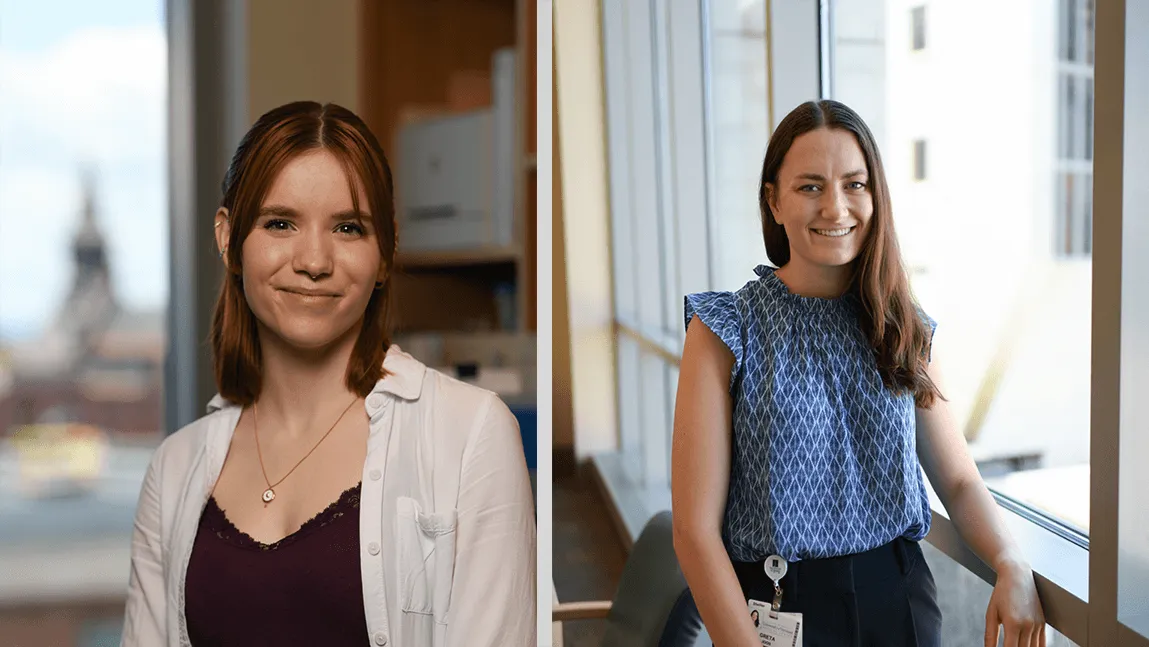Meet the UVM Cancer Center's 2025 Juckett Summer Fellows
The UVM Cancer Center is buzzing this summer as mentors and scholars dive into research. Out of 47 applicants, 20 students received $4,000-stipends to advance their skills and discoveries under expert guidance. Two standout scholars scored in the top 10% of all applicants and earned the distinguished Juckett Summer Fellowship, in recognition of their promising cancer research and potential to make a lasting impact. These fellows received an additional $1,000, or up to $5,000, depending on their graduate student status.
2025 Juckett Summer Fellows
Sara Santagostino (Medical Student)
Mentor: Ashley Volaric, M.D., Pathologist, Assistant professor of hematopathology at the Larner College of Medicine, and member of the Cancer Center’s Cancer Host and Environment research group
Project Title: Detection of Epstein-Barr virus latency patterns in primary large B-cell lymphoma of the CNS
Lay Summary: Epstein-Barr virus (EBV) is a virus that many people have; however, having it does not mean that someone will get cancer. The virus stays in the body quietly, but when the immune system is weak, it can cause cells to change and become cancerous.
Recently, scientists have found more EBV in cancers of people with a stronger immune system, though we do not fully understand why. Finding out if EBV is present could help doctors better identify, classify, and treat cancers. We are interested in how EBV might be connected to large cell lymphomas of the brain, a type of cancer found in people regardless of their immune status. We think the virus might be hiding so well that regular tests cannot detect it. By using better techniques to see this virus, we hope to understand its role in the development and outcome of this cancer arising in the brain.
Sara’s “Why”: “My longstanding interest in how Epstein-Barr virus (EBV) contributes to the development of lymphoid malignancies led me to investigate latent EBV infection in primary large B-cell lymphoma of the CNS (PCNS-LBCL), a rare and aggressive lymphoma arising in immuno-privileged sites.
While EBV is commonly linked to PCNS-LBCL in immunocompromised patients, it is considered rare in immunocompetent individuals based on conventional diagnostic methods. However, emerging ultrasensitive techniques suggest EBV may be more prevalent than previously recognized, raising the possibility that its role in PCNS-LBCL has been underestimated.
This project aims to determine the prevalence and the diagnostic and prognostic utility of EBV latency markers in PCNS-LBCL across both immunodeficient and immunocompetent settings. Ultimately, this work aligns with my broader goal of integrating clinical care with translational research to improve patient outcomes.”
Israel Odekunle (Grad Student)
Mentor: David J. Seward, M.D., Ph.D., Assistant Professor of Pathology and Laboratory Medicine, and a member of the Cancer Center’s Cancer Cell research group
Project Title: Utilizing Precision-Cut lung slices to study early transcriptional events in Kras-driven lung adenocarcinoma
Lay Summary: Lung cancer is the leading cause of cancer-related deaths worldwide. One in 16 men and one in 17 women will develop lung cancer, demonstrating the need for effective treatments or, if possible, a cure.
One reason lung cancer is so deadly is that it is typically diagnosed only after it has spread to other organs, leading to unignorable symptoms. Early-stage lung cancers frequently lack symptoms. However, we know that if we detect lung cancer early, outcomes are significantly better.
To improve early detection, our lab has established mouse models that develop lung cancer. We plan to remove these lungs from our mice and induce cancer in cell culture dishes. We will follow tumor formation microscopically and then extract RNA to detect what happens when a normal cell changes to a cancer cell. Then, using this information, we plan to develop a method to efficiently screen patients for lung cancer risk.
Israel’s “Why”: “As we speak, there’s still no cure for cancer, and lung cancer remains the deadliest. What’s most alarming is that it often shows no symptoms until it’s too late. I’m focused on understanding how the most common type of lung cancer starts, its warning signs at the early stage, and why it becomes so aggressive, especially when a key protective gene called Serine Theorine Kinase 11 (STK11) is lost. If we can detect these signs that happen at an early stage, we have a greater chance to save lives.”
To learn more about the UVM Cancer Center Summer Research Fellowship, please visit: https://go.uvm.edu/uvmccsrf.

